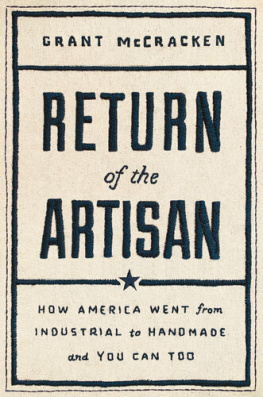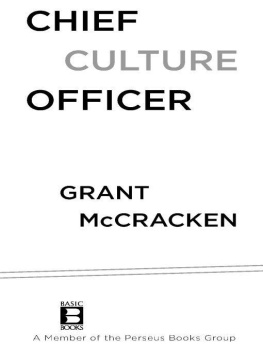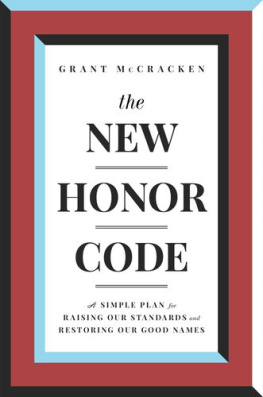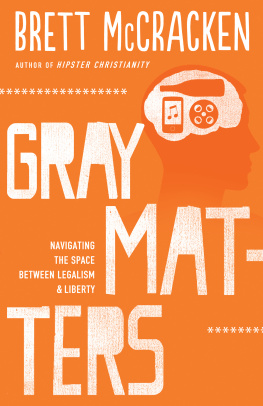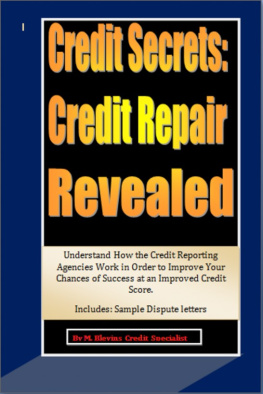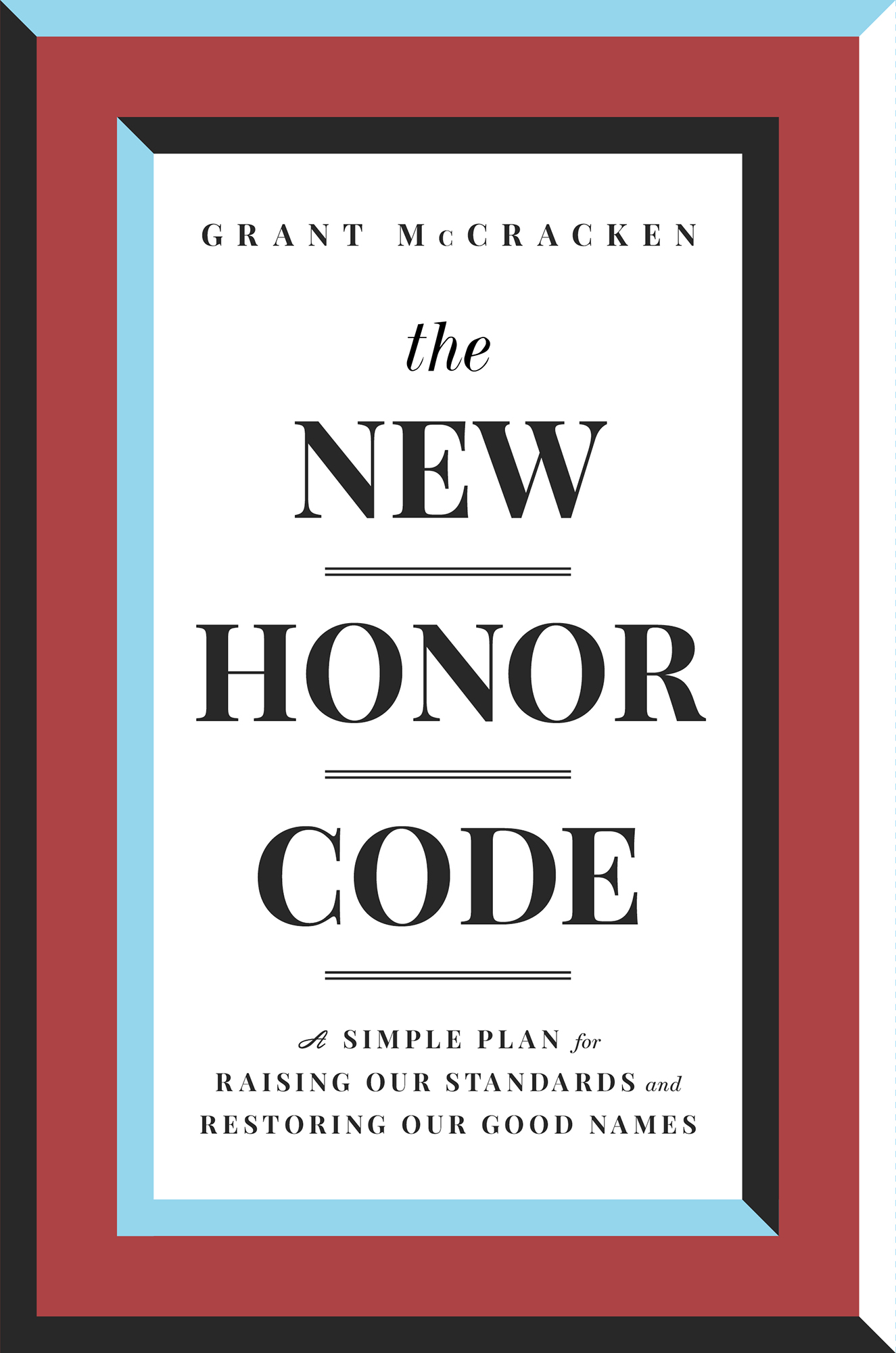Contents
Guide

An Imprint of Simon & Schuster, Inc.
1230 Avenue of the Americas
New York, NY 10020
www.SimonandSchuster.com
Copyright 2020 by Grant McCracken
All rights reserved, including the right to reproduce this book or portions thereof in any form whatsoever. For information, address Simon & Schuster Subsidiary Rights Department, 1230 Avenue of the Americas, New York, NY 10020.
First Tiller Press hardcover edition December 2020
TILLER PRESS and colophon are trademarks of Simon & Schuster, Inc.
For information about special discounts for bulk purchases, please contact Simon & Schuster Special Sales at 1-866-506-1949 or .
The Simon & Schuster Speakers Bureau can bring authors to your live event. For more information or to book an event, contact the Simon & Schuster Speakers Bureau at 1-866-248-3049 or visit our website at www.simonspeakers.com.
Interior design by Laura Levatino
Jacket design by Patrick Sullivan
Author photograph Yunji Ko
Library of Congress Cataloging-in-Publication Data has been applied for.
ISBN 978-1-9821-5464-6
ISBN 978-1-9821-5466-0 (ebook)
To Pamela, Zsa Zsa, Molly, and Vivienne
INTRODUCTION
H onor is fugitive. Its vagrant and miserable. Its on the lam. For hundreds of years and millions of people, it was a moral center of our lives. Now its reduced to a cudgel we use to scold students who cheat on their exams. How sad. Honor used to govern so much more than undergraduates. Now it has to sleep in its car.
In America, we have the architecture of faith. We have an intensity of conviction. But it feels as if our moral compass is broken. Good people do bad things. And bad peoplewell, the bad people are just monstrous.
We need a return to honor.
I was compelled to write this book in order to restore honor to a place of honor. I seek to return it to the lives of Americans, even OxyContin producers, Lance Armstrong, Charlie Rose, Lori Loughlin, Larry Nassar, Jeffrey Epstein, and the millions of other Americans who cant manage to do the right thing.
The absence of honor is a terrible thing. We have men installing locks on their office doors, behind which they abuse their employees. We have men who put people on the company payroll purely to serve their sexual needs. These are not creatures who have merely slipped the bonds of morality. These are predators who believe they are entitled to prey on the vulnerable.
These men are wrecking machines, attacking, humiliating, and destroying the accomplishments of hardworking parents and teachers, to say nothing of the young woman who comes to a great job in the big city and thinks, Wow, I made it. In a single encounter, she is preyed upon. The executive is Grendel, that Anglo-Saxon beast from Beowulf. America is his mead hall.
But sexual predation is just the beginning. A bank called Wells Fargo decided recently it would issue credit cards to people who didnt want them. In the subprime debacle, an entire banking industry made loans that eventually destabilized first the housing market and then the economy. Politicians lie routinely. So do some religious officials. So do a lot of people charged with public responsibility and what we used to call the public trust.
And when were not lying, were defaming. Speaking ill of the enemy, regardless of their actual crimes, is now standard on both sides of the aisle. Doubting their motives. Engaging in character assassination. We do not hesitate to say the most disreputable things about people who likely lead the same upstanding lives we do. We feast on these ruined reputations. We excoriate with glee.
And its not just bad in the short termits bad business all around. In the place of public trust, we are building a corrosive skepticism. We are ceasing to believe in our collective decency and driving ourselves into a wilderness from which we may not be able to escape.
I wanted to write this book for five reasons. The first was sheer shock at our scandalous state. Bad people doing terrible things. It just seemed endless. I thought, Wow, if you think you can make a difference, you really should try.
The second was a conversation I had with a state trooper Ill call Jim. This guy had invented his own honor code, or maybe he got it from the military. (You can decide when we talk about him in chapter 2.) Confronted by daily temptation, as we all are, he had found a way to resist it.
The third reason emerged when my wife and I got an email late in the day on a Sunday. Our neighbor Joan wanted to know if we would join her for what she called latkes and screaming. She was inviting everyone in the immediate neighborhood to celebrate the last day of Hanukkah. She would supply the latkes, she said. Neighborhood kids were welcome to come and supply the screaming.
We sat, four of us, at a large round table surrounded by kids, ten of them, in constant motion and, yes, screaming. There were several fathers in the kitchen. There were several mothers in the living room. And the four of us at the table watching menorah candles burn down.
We talked about our respective religions. My wife is a Roman Catholic, a believer from childhood. David was raised a Protestant in northern Virginia. He fell away in early adulthood and then rebuilt his conviction through study and prayer. Joan is, at eighty-two, clear and beautifully learned in her Judaism. And then theres me, a guy raised in Canada as a middle-church Protestant. No longer religious, really (unless Canadian counts as a religion, sometimes I think it does). But I have vigorous opinions on whats right and whats wrong. Religious, nomoral, yes.
The conversation was tidal, rushing into the shore of what we could say, and back out into philosophical depths when things were less clear. It was careful. Philosophically careful. What could we say? What could we not? And respectful. Oh, you think that! How interesting. No, we think this.
Its common these days to give lip service to diversity, but here it was in the flesh. Deeply felt differences, passionately debated. With no fear of animosity. None.
This made for a mystery. How could ordinary people like us, so deeply committed to our public and private moralities, surrounded by many millions of equally religious and/or moral people, still find ourselves living in an America that feels corrupt and scandalous?
The fourth reason came when I was talking to a friend whos in charge of data for a large Silicon Valley company. Corporations can see American culture is changing. Michele (not her real name) said she was noticing data that could suggest a change in the way mothers thought about themselves and their kids. (If you ever want to get an anthropologists attention, tell him child-rearing is changing. This is a chance to see what the future will look like in eighteen years.) You cant detect the future on the strength of something like this alone, so I started looking more broadly. (I run a device called the Griff that tracks and measures data and the changes these data reveal.)
When I checked, sure enough, the Griff was blinking, indicating that change was coming fast and furious. You could see a group of women beginning to ask whether they were raising their kids the best way. To learn more, I spoke to Lenore Skenazy, the author of

